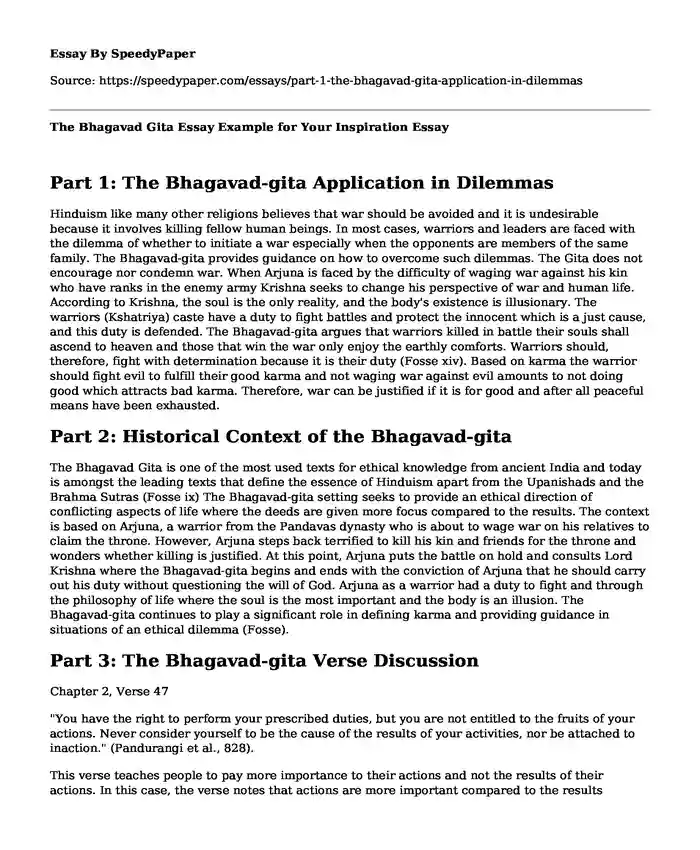Part 1: The Bhagavad-gita Application in Dilemmas
Hinduism like many other religions believes that war should be avoided and it is undesirable because it involves killing fellow human beings. In most cases, warriors and leaders are faced with the dilemma of whether to initiate a war especially when the opponents are members of the same family. The Bhagavad-gita provides guidance on how to overcome such dilemmas. The Gita does not encourage nor condemn war. When Arjuna is faced by the difficulty of waging war against his kin who have ranks in the enemy army Krishna seeks to change his perspective of war and human life. According to Krishna, the soul is the only reality, and the body's existence is illusionary. The warriors (Kshatriya) caste have a duty to fight battles and protect the innocent which is a just cause, and this duty is defended. The Bhagavad-gita argues that warriors killed in battle their souls shall ascend to heaven and those that win the war only enjoy the earthly comforts. Warriors should, therefore, fight with determination because it is their duty (Fosse xiv). Based on karma the warrior should fight evil to fulfill their good karma and not waging war against evil amounts to not doing good which attracts bad karma. Therefore, war can be justified if it is for good and after all peaceful means have been exhausted.
Part 2: Historical Context of the Bhagavad-gita
The Bhagavad Gita is one of the most used texts for ethical knowledge from ancient India and today is amongst the leading texts that define the essence of Hinduism apart from the Upanishads and the Brahma Sutras (Fosse ix) The Bhagavad-gita setting seeks to provide an ethical direction of conflicting aspects of life where the deeds are given more focus compared to the results. The context is based on Arjuna, a warrior from the Pandavas dynasty who is about to wage war on his relatives to claim the throne. However, Arjuna steps back terrified to kill his kin and friends for the throne and wonders whether killing is justified. At this point, Arjuna puts the battle on hold and consults Lord Krishna where the Bhagavad-gita begins and ends with the conviction of Arjuna that he should carry out his duty without questioning the will of God. Arjuna as a warrior had a duty to fight and through the philosophy of life where the soul is the most important and the body is an illusion. The Bhagavad-gita continues to play a significant role in defining karma and providing guidance in situations of an ethical dilemma (Fosse).
Part 3: The Bhagavad-gita Verse Discussion
Chapter 2, Verse 47
"You have the right to perform your prescribed duties, but you are not entitled to the fruits of your actions. Never consider yourself to be the cause of the results of your activities, nor be attached to inaction." (Pandurangi et al., 828).
This verse teaches people to pay more importance to their actions and not the results of their actions. In this case, the verse notes that actions are more important compared to the results (Sanskriti 1). The results are influenced by many factors and should not derail an individual from carrying out their duties. This verse applies to the decision of deciding on whether to engage in war in that the decision does not rest on an individual but by their commitments. For instance, a warrior's duty is to fight for his people and should act based on their duties and not be derailed from accomplishing their duties based on the possible results.
Works Cited
Fosse, Lars Martin. The Bhagavad Gita. BookBaby, 2007.
Pandurangi, Ananda K., Sudhakar Shenoy, and Matcheri S. Keshavan. "Psychotherapy in the Bhagavad Gita, the Hindu scriptural text." American Journal of Psychiatry 171.8 (2014): 827-828.
Sanskriti, Mana. "The Four Noble Truths." Vepachedu Educational Foundation. 1998
Cite this page
The Bhagavad Gita Essay Example for Your Inspiration. (2022, Aug 19). Retrieved from https://speedypaper.net/essays/part-1-the-bhagavad-gita-application-in-dilemmas
Request Removal
If you are the original author of this essay and no longer wish to have it published on the SpeedyPaper website, please click below to request its removal:
- Implementation of Information Technology in an Organization
- The Night Circus by Erin Morgenstern - Free Essay on Literature
- Essay Sample: Critical Appraisal of Evidence-Based Guidelines for Atherosclerosis
- Persuasive Essay Sample about Zodiac the Serial Killer
- We Were Soldiers - Movie Review Essay Sample
- Free Essay on How Real-Life Experiences of Emily Dickinson Influenced Her Writing
- Free Essay: Robo-Journalism And Future Journalism
Popular categories





